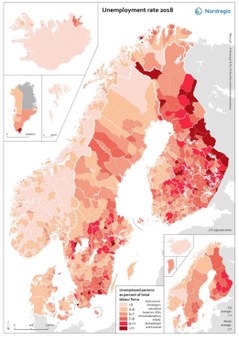Labour Market
More culture, less bureaucracy – the keys to a more mobile Nordic labour market
By 2030, the Nordics should be the world’s most integrated, sustainable and competitive region. The open Nordic labour market is key to fulfilling that ambition. But mobility is low and may need to be stimulated by administrative and cultural measures, according to recent research.
Norway tightens rules on hired labour
Norway is tightening the rules on hired labour. Trade unions are cheering while staffing agencies rage and have reported Norway to ESA for being in breach of the EEA agreement.
Scandinavian data centres: fewer jobs and less profit than forecast
New data centres are popping up in Norway and Sweden along with a lot of hope for many new jobs and high returns.
Four new Nordic labour ministers – and their challenges
In 2022, both Norway, Sweden and Denmark got new labour ministers. Here is your chance to get to know them better.
How to include more people in the Nordic labour markets?
If every Nordic country learned from each other’s successes, 700 000 more people could be in work, according to Danish researchers Sarah Kildahl Nielsen and Vibeke Jakobsen.
Nordic men face different challenges from women in non-traditional jobs
Young women training to join typically male-dominated occupations make difficult choices but are also spurred on by family, teachers and politicians and end up with a high-status job. But when young men choose healthcare jobs, they get neither status nor good pay.
The tough road to male occupations in Denmark
Amalie Schwartz is a newly qualified electrician and the only woman in a workplace with 80 people. She is busy changing that disparity every day at work and as an ambassador for the Boss Ladies project.
Sudden growth creates problems for Icelandic tourism
Icelandic tourism has bounced back faster than expected. The head of the travel industry likens it to champagne flowing when the cork has popped. Thanks to government support most of the tourist companies survived.
Labour market policies a challenge for Swedish government negotiations
Labour market issues were overshadowed by crime, high energy prices and immigration in the run-up to the Swedish election. As the centre-right block tries to negotiate a government platform supported by the Sweden Democrats, unemployment and public health insurance might be among the political chess pieces.
Norway’s labour shortages stretch to “the furthest island”
The lack of qualified labour has become a major problem in many places in the Nordics. In the Norwegian county of Trøndelag unemployment has never been lower. This can also be felt on Frøya, an island of some 5,000 people.
Trailblazing development of green steel in Swedish Boden
Mass production of fossil-free steel is to be the arrowhead of the green transition in Northern Sweden. The initiative aims to mitigate climate change and meet the world’s needs for sustainability. With it come many new jobs and a need for new housing.
Image of macho Northern Swedish man must go to secure recruitment
A gun on his back, snus tobacco under his lip and a misogynistic worldview, he drives around on his scooter. This image of the primitive Norrlänning – a person from Sweden’s northernmost county – became ingrained with the 1996 movie The Hunters. Now Northern Sweden is hunting for people to carry out the so-called green revolution, and that image has to go.
The train to Russia stopped running. Lappeenranta limps on.
The borderless Nordic region turned out to be an illusion during the pandemic. It hit the Øresund region, border trade between Sweden and Norway and the citizens of Haparanda and Tornio. But Finland has an eastern border where traffic has ceased because of the pandemic. Today the war in Ukraine has made the situation even worse for Lappeenranta – the city with the closest links with Russia.
Varða in Iceland: a bridge between trade unions and academics
Iceland's labour market research institute Varða was set up in February 2020 by The Icelandic Confederation of Labour ASÍ and the Confederation of State and Municipal Employees BSRB. The purpose was to strengthen social and economic labour market research and bridge the gap between academics and the labour market.
Sweden: most casual jobs and lowest work protection
Sweden has the highest unemployment levels among the Nordics, and also more casual jobs and lower employment protection levels for those on temporary contracts. An award-winning dissertation shows the consequences deregulation has had for people without permanent employment.
Will Greenland get the mining adventure off the ground?
Greenland is about to introduce a range of reforms aimed at creating a well-functioning labour market and a stable framework for foreign investments in industries like mining.
Guðmundur Ingi Guðbrandsson: Planned to be a sheep farmer, now Iceland's labour minister
A new government in Iceland was announced on 28 November, over two months after the parliamentary elections. The new labour minister is Guðmundur Ingi Guðbrandsson from the Left-Green Movement.
Hadia Tajik, a trade union-supporting labour minister
Hadia Tajik, Norway's new Minister of Labour and Social Inclusion, is a strong defender of trade unions. She will be responsible for what the red-green coalition government calls a spring clean of the labour market.
New Swedish delegation to fight work-related crime
On 27 September, the Swedish government took another step in the fight against work-related crime when it presented a delegation tasked with increasing knowledge about the issue while supporting the authorities working to stop it.
Labour shortages all around, including in the Danish film industry
It is hard to find tradespeople who have time for new projects and the Danish film industry is short of everything from actors to scriptwriters. Businesses are asking the government for more foreign labour.
Document Actions



 Follow us on Facebook
Follow us on Facebook
